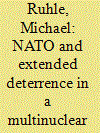| Srl | Item |
| 1 |
ID:
077684


|
|
|
|
|
| Publication |
2007.
|
| Summary/Abstract |
The debate on nuclear proliferation has become increasingly polarized. While there is widespread agreement on the perilous state of the traditional non-proliferation regime, the analyses of the causes differ widely. The liberal arms control community has sought to salvage the eroding non-proliferation regime both by overplaying its importance (nuclear enlightenment') as well as by blaming the policies of the nuclear weapons states, notably the United States. However, this view rests on several assumptions that have been increasingly revealed as myths: the myth of a universal non-proliferation norm generated largely by the Non-proliferation Treaty; the myth of a direct relationship between nuclear reductions and proliferation; and the myth of US policy being a cause of, rather than a reaction to, the non-proliferation crisis. Clinging to these myths is counterproductive, as it seeks to perpetuate old policies at the expense of new approaches. However, new approaches to non-proliferation are bound to gain in importance, even if they run counter to established arms control dogmas
|
|
|
|
|
|
|
|
|
|
|
|
|
|
|
|
| 2 |
ID:
086631


|
|
|
|
|
| Publication |
2009.
|
| Summary/Abstract |
Concerns about nuclear proliferation have led to a new wave of enthusiasm for far-reaching nuclear disarmament schemes. According to their proponents, the United States must take the lead in generating a new global disarmament dynamic, including withdrawing the remaining U.S. tactical nuclear weapons from Europe. Such a step will not spell the end of extended deterrence, yet its drawbacks would far outweigh its gains. While achieving little in terms of relaunching disarmament, it would weaken nuclear sharing as an important achievement of managing alliance security. In an emerging multinuclear strategic environment, maintaining a visible nuclear bond between the United States and its NATO allies is not a Cold War relic, but a sensible and nonprovocative means of both deterrence and nonproliferation.
|
|
|
|
|
|
|
|
|
|
|
|
|
|
|
|
| 3 |
ID:
087203


|
|
|
|
|
| Publication |
2009.
|
| Summary/Abstract |
Concerns about nuclear proliferation have led to a new wave of enthusiasm for far-reaching nuclear disarmament schemes. According to their proponents, the United States must take the lead in generating a new global disarmament dynamic, including withdrawing the remaining US tactical nuclear weapons from Europe. Such a step will not spell the end of extended deterrence, yet its drawbacks would far outweigh its gains.
|
|
|
|
|
|
|
|
|
|
|
|
|
|
|
|
| 4 |
ID:
009449


|
|
|
|
|
| Publication |
Winter 1994-95.
|
| Description |
66-75
|
|
|
|
|
|
|
|
|
|
|
|
|
|
|
|